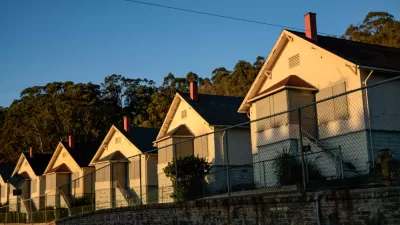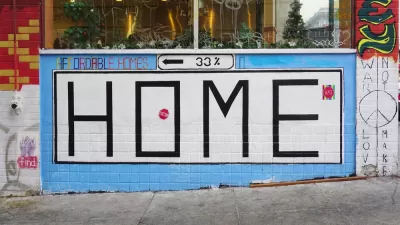Tired of not closing deals to preserve affordable housing due to delays in public financing, the nonprofit Housing Partnership Network created a real estate investment trust. The results have been "game changing."
Pam Fessler studies the example of the Housing Partnership Network, a coalition of housing nonprofits that created a real estate investment trust (REIT) to become more competitive in the housing market.
Dependent on government bond issues and housing tax breaks to pay for projects created a typical problem, according to Chrsistopher LoPiano, VP of Community Preservation and Development Corp., an affordable housing nonprofit in the Washington, D.C., area and Virginia "What we're not competitive on is closing quickly," says Lopiana in Fessler's report, "because we're dependent upon public financing, and public financing just takes longer."
"So...the Housing Partnership Network, decided it was time to get creative — to do what private investors have done for decades. They became the first nonprofits to form what's called a real estate investment trust, or REIT."
"The nonprofit groups figured they could offer potential investors a modest return on their money — about 5 to 7 percent. It's less than what they'd get from a private-sector REIT, but the groups also appealed to investors' desire to preserve affordable housing. And they got several big ones — Prudential, Morgan Stanley, Citibank and the Ford and MacArthur foundations — to chip in an initial $100 million."
The report has more on the initial successes and challenges of the REIT arrangement for the nonprofit sector. "So far, the Housing Partnership trust has purchased three properties like this — in Virginia, Illinois and California. Ades says the trust is looking at other apartments and making plans to raise an additional $250 million."
Fessler's lede mentions the rental housing by the Joint Center for Housing Studies at Harvard, which was also detailed recently by the Sustainable Housing Collective.
FULL STORY: Nonprofits Pull In Investors To Tackle Housing Affordability

Maui's Vacation Rental Debate Turns Ugly
Verbal attacks, misinformation campaigns and fistfights plague a high-stakes debate to convert thousands of vacation rentals into long-term housing.

Planetizen Federal Action Tracker
A weekly monitor of how Trump’s orders and actions are impacting planners and planning in America.

San Francisco Suspends Traffic Calming Amidst Record Deaths
Citing “a challenging fiscal landscape,” the city will cease the program on the heels of 42 traffic deaths, including 24 pedestrians.

Defunct Pittsburgh Power Plant to Become Residential Tower
A decommissioned steam heat plant will be redeveloped into almost 100 affordable housing units.

Trump Prompts Restructuring of Transportation Research Board in “Unprecedented Overreach”
The TRB has eliminated more than half of its committees including those focused on climate, equity, and cities.

Amtrak Rolls Out New Orleans to Alabama “Mardi Gras” Train
The new service will operate morning and evening departures between Mobile and New Orleans.
Urban Design for Planners 1: Software Tools
This six-course series explores essential urban design concepts using open source software and equips planners with the tools they need to participate fully in the urban design process.
Planning for Universal Design
Learn the tools for implementing Universal Design in planning regulations.
Heyer Gruel & Associates PA
JM Goldson LLC
Custer County Colorado
City of Camden Redevelopment Agency
City of Astoria
Transportation Research & Education Center (TREC) at Portland State University
Jefferson Parish Government
Camden Redevelopment Agency
City of Claremont




























